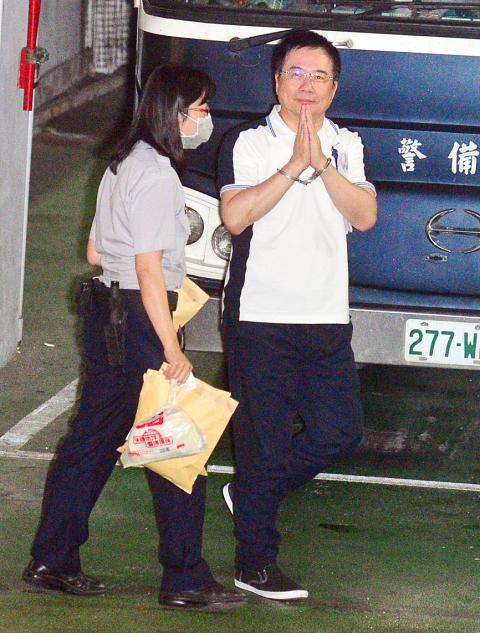The Taipei District Court yesterday detained former Chinese Nationalist Party (KMT) Central Policy Committee director Alex Tsai (蔡正元) over allegations that he embezzled NT$370 million (US$12.17 million) from Central Motion Pictures Corp (CMPC, 中央電影公司).
A judge ordered him held incommunicado, saying that there was a possibility he might flee, tamper with evidence or attempt to communicate with other principles in the case.
He was put in handcuffs and taken to the Taipei Detention Center in the morning.

Photo: Wang Yi-sung, Taipei Times
After questioning Tsai, his wife Queena Hung (洪菱霙) and seven other people, the Taipei District Prosecutors’ Office said it has sufficient evidence to charge Tsai with embezzlement, breach of trust and other offenses, stemming from a series of financial transactions in the late 2000s connected with CMPC.
Democratic Progressive Party legislators yesterday urged prosecutors to reopen a shelved investigation into former president Ma Ying-jeou’s (馬英九) role in the sale of CMPC and other KMT-related assets while he was party chairman.
Taipei district prosecutors said that in 2006 Tsai talked investor Chuang Wan-chun (莊婉均) into purchasing 80 percent of CMPC shares for NT$3.1 billion, asking Cheng Uei Precision Industry (正崴精密工業) chairman Gou Tai-chiang (郭台強) and his wife, Lor Yu-chen, (羅玉珍) to act as guarantors of the deal.
Gou is a younger brother of Terry Gou (郭台銘), chairman of Hon Hai Precision Industry Co (鴻海精密).
The three parties reached an agreement that ownership of the shares would be registered to Apollo Investment Co (阿波羅公司), a company founded by Tsai, prosecutors said, adding that Tsai, Chuang and Lor ran Apollo together.
Later in 2006, Tsai convened a meeting of shareholders to discuss a capital reduction proposal, and they resolved to reduce CMPC’s capital by NT$580 million, which was then entrusted to Apollo.
However, Tsai signed a contract with himself on behalf of Apollo, entrusting NT$430 million of the capital reduction funds to his name, prosecutors said.
Apollo then transferred the funds to the private accounts of Queena Hung, who was the head of Tsai’s legislative office at the time, and Tsai himself, prosecutors said.
Tsai also used the funds to invest on his own account, including in the property market, and the overall movement of funds eventually resulted in NT$240 million in losses for Apollo, prosecutors said.
In July 2010, when Apollo’s contract entrusting funds to Tsai expired, Tsai transferred NT$130 million to accounts held by Apollo, which included the account of a company registered under Hung’s name, prosecutors said.
Tsai sent somebody to withdraw the funds and deposit them in one of Tsai’s accounts, and the former lawmaker used the money to buy property, stocks and foreign currency and pay his credit card bills, prosecutors said.
During the detention hearing, Tsai denied all of the allegations and described them as political persecution.
Tsai’s lawyer said he would file an appeal against his detention.

Taiwan is gearing up to celebrate the New Year at events across the country, headlined by the annual countdown and Taipei 101 fireworks display at midnight. Many of the events are to be livesteamed online. See below for lineups and links: Taipei Taipei’s New Year’s Party 2026 is to begin at 7pm and run until 1am, with the theme “Sailing to the Future.” South Korean girl group KARA is headlining the concert at Taipei City Hall Plaza, with additional performances by Amber An (安心亞), Nick Chou (周湯豪), hip-hop trio Nine One One (玖壹壹), Bii (畢書盡), girl group Genblue (幻藍小熊) and more. The festivities are to

Auckland rang in 2026 with a downtown fireworks display launched from New Zealand’s tallest structure, Sky Tower, making it the first major city to greet the new year at a celebration dampened by rain, while crowds in Taipei braved the elements to watch Taipei 101’s display. South Pacific countries are the first to bid farewell to 2025. Clocks struck midnight in Auckland, with a population of 1.7 million, 18 hours before the famous ball was to drop in New York’s Times Square. The five-minute display involved 3,500 fireworks launched from the 240m Sky Tower. Smaller community events were canceled across New Zealand’s

‘IRRESPONSIBLE’: Beijing’s constant disruption of the ‘status quo’ in the Taiwan Strait has damaged peace, stability and security in the Indo-Pacific region, MOFA said The Presidential Office yesterday condemned China’s launch of another military drill around Taiwan, saying such actions are a “unilateral provocation” that destabilizes regional peace and stability. China should immediately stop the irresponsible and provocative actions, Presidential Office spokeswoman Karen Kuo (郭雅慧) said, after the Chinese People’s Liberation Army (PLA) yesterday announced the start of a new round of joint exercises around Taiwan by the army, navy and air force, which it said were approaching “from different directions.” Code-named “Justice Mission 2025,” the exercises would be conducted in the Taiwan Strait and in areas north, southwest, southeast and east of Taiwan

UNDER WAY: The contract for advanced sensor systems would be fulfilled in Florida, and is expected to be completed by June 2031, the Pentagon said Lockheed Martin has been given a contract involving foreign military sales to Taiwan to meet what Washington calls “an urgent operational need” of Taiwan’s air force, the Pentagon said on Wednesday. The contract has a ceiling value of US$328.5 million, with US$157.3 million in foreign military sales funds obligated at the time of award, the Pentagon said in a statement. “This contract provides for the procurement and delivery of 55 Infrared Search and Track Legion Enhanced Sensor Pods, processors, pod containers and processor containers required to meet the urgent operational need of the Taiwan air force,” it said. The contract’s work would be